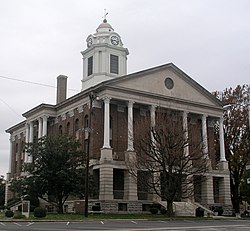2020 census
As of the 2020 census, there were 50,237 people and 12,704 families residing in the county. The median age was 38.0 years, with 25.0% of residents under the age of 18 and 15.7% of residents 65 years of age or older. For every 100 females there were 98.6 males, and for every 100 females age 18 and over there were 97.0 males age 18 and over. [12]
There were 18,350 households in the county, of which 34.6% had children under the age of 18 living in them. Of all households, 48.5% were married-couple households, 18.0% were households with a male householder and no spouse or partner present, and 25.8% were households with a female householder and no spouse or partner present. About 24.4% of all households were made up of individuals and 11.2% had someone living alone who was 65 years of age or older. There were 19,685 housing units, of which 6.8% were vacant. Among occupied housing units, 69.2% were owner-occupied and 30.8% were renter-occupied. The homeowner vacancy rate was 1.4% and the rental vacancy rate was 5.3%. [12]
The racial makeup of the county was 75.6% White, 7.2% Black or African American, 0.8% American Indian and Alaska Native, 0.7% Asian, 0.1% Native Hawaiian and Pacific Islander, 9.0% from some other race, and 6.5% from two or more races. Hispanic or Latino residents of any race comprised 15.3% of the population. [13]
44.9% of residents lived in urban areas, while 55.1% lived in rural areas. [14]
2000 census
As of the census of 2000, there were 37,586 people, 13,905 households, and 10,345 families residing in the county. The population density was 79 people per square mile (31 people/km2). There were 14,990 housing units at an average density of 32 per square mile (12/km2). The racial makeup of the county was 86.84% White, 11.48% Black or African American, 0.28% Native American, 0.45% Asian, 0.05% Pacific Islander, 2.73% from other races, and 1.16% from two or more races. 7.48% of the population were Hispanic or Latino of any race.
There were 13,905 households, out of which 34.00% had children under the age of 18 living with them, 57.30% were married couples living together, 11.90% had a female householder with no husband present, and 25.60% were non-families. 21.50% of all households were made up of individuals, and 9.20% had someone living alone who was 65 years of age or older. The average household size was 2.67 and the average family size was 3.06.
In the county, the population was spread out, with 25.80% under the age of 18, 9.90% from 18 to 24, 29.70% from 25 to 44, 22.00% from 45 to 64, and 12.70% who were 65 years of age or older. The median age was 35 years. For every 100 females there were 98.40 males. For every 100 females age 18 and over, there were 97.00 males.
The median income for a household in the county was $36,729, and the median income for a family was $33,691. Males had a median income of $25,485 versus $15,673 for females. The per capita income for the county was $13,698. About 12.70% of families and 25.10% of the population were below the poverty line, including 15.90% of those under age 18 and 17.80% of those age 65 or over.



